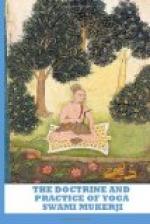Exercise 1.
Sit still; relax your body all over and then neck, chest, and head held in a straight line; legs crossed one under the other and weight of the body resting easily upon the ribs; right hand on right leg, left hand on left leg. There should not be a single movement of the muscles in any part of the body. Mind, you must avoid all rigidness and tension of the body. There should not be the least strain on muscles. You should be able to “relax” completely. Start with 5 minutes. Continue till you can accomplish the 5 minutes sitting without any conscious effort, increase to 15 minutes which is about all you need. The aim is to give you absolute dominion over all involuntary muscular movements. It is also an ideal “rest-cure” after fatiguing physical and mental exercise or exertion. The principal thing is “STILLNESS” and you can, if you like, practise it even sitting on a chair or anywhere else; the idea is one of “relaxation” and physical and mental quietude. Let not the apparent simplicity of this exercise deceive you. It is not so very easy after all. You will find that by concentrating the mind upon a particular train of thoughts or ideas or by joining the mind to the Larger Self, you can easily lose all idea of the body and thus maintain this stillness for a considerable length of time. Genius, inspiration and intuition are more or less the scientific and psychological results of self-forgetfulness. “When he sits down to meditate,” it was said of Vivekananda, “in 10 minutes he becomes quite unconscious of the body although it may be black with mosquitoes.” Do you understand now? Absolute physical self-forgetfulness is essential to deep concentration. Dr. Fahnestock called it the “STATUVOLIC” condition or that state in which the Will-Power is really active and the ‘outer-self’ is totally in abeyance and forgotten.
Exercise 2.
Cultivate a self-poised attitude and demeanour in your everyday life. Avoid a tense, strained, nervous, fidgety manner and an over-anxious appearance. Be easy, self-possessed and dignified in your bearing. Be courteous, thoughtful and quiet. Mental exercise and Will-Culture will enable you to acquire the proper carriage and demeanour. Stop swinging your feet and moving your hands or rocking your self backwards in your chair while talking or sitting. Stop biting your nails, chewing your moustaches, rolling your tongue in your mouth or any other unnecessary movement




